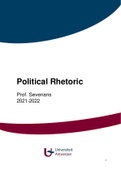Political Rhetoric
Political Rhetoric
Prof. Sevenans
2021-2022
1
, Political Rhetoric
1 Introduction
1.1 The importance of political rhetoric
Politics is based on persuasion. Persuasion is possible because we are confronted with
choice, options, decisions, judgements, etc. There is fear and uncertainty in society. It is
inherent in a human world. Martin makes a distinction between persuasion (brute force) and
mutual understanding.
• No politics without persuasion, because of uncertainty. By its very nature, politics
requires choices to be formulated, options to be weighted and decisions to be made.
• Persuasion by speech = more powerful because it is voluntary (vs. persuasion by
force)
o By speech: the ability to address others and to define problems and their
solutions
= the dominant medium of persuasion in human societies
e.g. You vote for a party because you want to, it’s voluntary (more powerful form)
o By force: there could be a punishment
The fundamental political skill = knowing how to speak (whether in voiced words, written text
or a combination) in order to successfully persuade
1.1.1. What is rhetoric?
• Comes from the Greek “Retoriketekhne’
o Rhetor = speaker
o Tekhne = art
• Studying rhetoric: 2 definitions
o Learning the techniques to persuade someone (practical)
o Studying the persuasiveness of speech (the analysis)
• Not limited to spoken word (oratory), also written words and visuals are used.
1.1.1 Political rhetoric
• Many areas of rhetorical studies
o E.g. law, organization studies,…
• Persuasion in the political realm
• Not limited to politicians!
o Activists e.g. Emma Watson
o Media
o …
• “What makes a political speech persuasive (or not)?”
1.1.2 Warm-up exercise
• Martin Luther King – I have a dream
o Activist leader of civil rights
o 1963
o 100 years after the emancipation proclamation of Lincoln
o 250.000 protestants
2
, Political Rhetoric
• Elements
o His credibility as a person
o Use of rhetorical devices
▪ The use of metaphors
▪ The use of repetitions
➢ “We cannot be satisfied with…”
➢ “I have a dream…”
o Short breaks
o How he speaks: loud and clear
o Arousal of emotion
1.1.2. A diverse research field
• Linguistics
• Psychology
• Political science
• Communication science
Have their own terminology and research methods.
Difficulty: they don’t always talk to each other
1.2 Rhetoric, a contested notion
Positive ➔ negative
• Negative
o Words often associated with rhetoric: mere and empty,
o Association with danger
▪ It can make people act violently
▪ Can people be persuaded of anything? (violence, misinformation)
• Positive
o no democracy without free speech
1.3 Rhetoric was central to ancient democracy
Situated in Greece, 500 Before Christ
• From aristocracy to democracy
o Demos = people
o Ekklesia
• Highly participatory system
o Status of being citizen comes with obligations
• Rhetorical skills were important
• Teachers: sophists
o Sophos = wisdom
o Such as Gorgias and Protagoras
• Culture of oral transmission
There were different views of classical thinkers: Plato, Aristotle, Cicero, Hobbes and
Rousseau
3
, Political Rhetoric
1.1.1. Biggest critique came from Plato
For Plato, a just state should be founded on knowledge of incontestable principles, not
persuasion.
• Democracy is bullshit
• Belief in one moral “truth”
o “Allegory of the cave”: The main theme of Plato's Allegory of the Cave in the
Republic is that human perception cannot derive true knowledge, and instead,
real knowledge can only come via philosophical reasoning. In Plato's
example, prisoners live their entire lives in a cave, only able to see shadows.
To them, these shadows are reality.
o Only a small elite can see it.
• Rhetoric is empty and dangerous according to Plato
o It can persuade most people of anything
o Can do bad instead of good
• He wrote a book called “The republic”
o Society should be based on reason
o Strict division: philosopher-kings, guardians and traders
• Ideas were later criticized (Popper)
• More sympathetic reading: argument for alternative type of rhetoric (dialetic)
• His student: Aristotle had a more positive reading of rhetoric
1.1.2. Aristotle
Aristotle is a student of Plato. He didn’t believe this ‘real truth’, more positive reading of
rhetoric. A man is a ‘political animal’
• It was speech that distinguished humans from the other animals and that enabled him
to communicate moral ideas.
o ‘Good life” is life in accordance with community (vs. Plato: natural state)
• Rhetoric complements philosophical reasoning
o How should the best case be put, given the argument, evidence and
audience?
o Best case is not always clear
• His best work: “the art of rhetoric”
• Disclaimer: exclusive notion of ‘citizen’
o Importance of ‘enthymeme’: when you make a good argument you should
base yourself on logical premisses. He drops a premisses and leaves aside
common knowledge.
o Degree of permitted disagreement is limited
1.1.3. Cicero
• Great orator of the roman world
• Treatises on rhetoric (e.g. de oratore)
• Like Aristotle, refuted sophism
o Understanding of topic comes first, then follows a good speech
o But he was pragmatic and uses techniques to manipulate people and
convince them of his ideas.
• Persuasion is not about techniques but about the talent to adapt.
4




